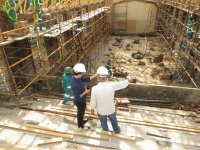This case study explores the various sustainability initiatives undertaken by Roll Steel and their impact on the company and the environment. From energy conservation to waste management, Roll Steel has adopted a holistic approach to sustainability. The company's commitment to these practices demonstrates that industrial growth and environmental stewardship can go hand in hand.
In the following sections, we will delve deeper into specific areas where Roll Steel has made significant strides in sustainability. By examining these practices, we can gain insights into how similar companies can adopt and benefit from sustainable operations.
Energy efficiency and carbon footprint reduction
One of the primary areas of focus for Roll Steel’s sustainability efforts is energy efficiency. Steel production is an energy-intensive process, and the company has implemented several initiatives to reduce its energy consumption. These include upgrading to more energy-efficient machinery, optimizing production processes, and investing in renewable energy sources such as solar and wind power. These measures have significantly reduced the company's overall energy usage.
In addition to improving energy efficiency, Roll Steel has taken steps to reduce its carbon footprint. The company has set ambitious targets for lowering greenhouse gas emissions, which it aims to achieve through both direct and indirect measures. Direct measures include improving combustion efficiency in furnaces and kilns, while indirect measures involve sourcing materials from suppliers who adhere to similar sustainability standards. These efforts have resulted in a measurable decrease in the company’s carbon emissions, aligning it with global climate goals.
Moreover, Roll Steel has implemented a rigorous monitoring and reporting system to track its progress in energy efficiency and carbon footprint reduction. This transparency not only helps the company stay on track with its goals but also allows stakeholders to hold it accountable. Through these initiatives, Roll Steel is setting a benchmark for sustainability in the steel industry.
Water conservation and management
Water is a critical resource in steel manufacturing, used extensively in cooling, cleaning, and processing. Recognizing the importance of sustainable water management, Roll Steel has implemented various measures to reduce water usage and improve water quality. One of the key initiatives is the adoption of closed-loop water systems, which recycle water within the plant, significantly reducing the need for fresh water intake.
Roll Steel has also invested in advanced water treatment facilities to ensure that any water discharged from its operations meets or exceeds environmental standards. These treatment processes remove harmful contaminants, making the water safe for release back into the environment. In some cases, treated water is even reused within the plant, further minimizing the company’s water footprint.
Furthermore, Roll Steel engages in regular audits of its water usage and management practices to identify areas for improvement. These audits are part of a broader sustainability strategy that includes ongoing research and development to find new ways to conserve water. By prioritizing water conservation, Roll Steel is contributing to the long-term sustainability of both its operations and the surrounding communities.
Waste reduction and recycling initiatives
Waste management is another critical component of Roll Steel’s sustainability efforts. The company has adopted a zero-waste-to-landfill policy, striving to minimize waste generation and maximize recycling. This policy has led to the implementation of numerous waste reduction strategies across all stages of production, from raw material sourcing to the final product.
One of the key aspects of this policy is the recycling of steel scrap, which is melted down and reused in the production process. This not only reduces the need for virgin raw materials but also decreases the energy required for production. Roll Steel has also developed innovative ways to recycle by-products from the steelmaking process, such as slag and dust, which are repurposed for use in construction and other industries.
In addition to recycling, Roll Steel has implemented measures to reduce waste at the source. This includes optimizing production processes to minimize material wastage and improving inventory management to prevent overproduction. These initiatives have significantly reduced the company’s waste generation, furthering its commitment to sustainability.
Community engagement and environmental stewardship
Roll Steel’s sustainability efforts extend beyond its operations to include active community engagement and environmental stewardship. The company recognizes that its impact on the environment is not limited to its production facilities, and it strives to be a positive force in the communities where it operates. This includes working closely with local governments, environmental organizations, and community groups to promote sustainable practices and improve environmental outcomes.
One of the ways Roll Steel engages with the community is through educational programs that raise awareness about sustainability and environmental protection. These programs are designed to inform and inspire the next generation of environmental stewards, fostering a culture of sustainability that extends beyond the company’s immediate operations. Additionally, Roll Steel supports local environmental initiatives through funding and volunteer efforts, further demonstrating its commitment to the communities it serves.
Roll Steel also collaborates with other industries and stakeholders to develop and implement best practices for environmental management. This collaborative approach helps to drive broader industry-wide change, contributing to a more sustainable future. Through these efforts, Roll Steel is not only improving its own environmental performance but also helping to elevate the sustainability standards of the entire steel industry.
Challenges and future outlook
While Roll Steel has made significant progress in its sustainability journey, the company continues to face challenges. One of the primary challenges is balancing the cost of sustainable practices with the need to remain competitive in a global market. Implementing energy-efficient technologies, recycling initiatives, and water conservation measures often require substantial upfront investments, which can be a barrier for many companies in the industry.
Another challenge is the ever-evolving regulatory landscape. As governments around the world tighten environmental regulations, Roll Steel must continuously adapt its practices to comply with new standards. This requires ongoing monitoring, reporting, and adjustments to the company’s sustainability strategies. Despite these challenges, Roll Steel remains committed to its sustainability goals, recognizing that these efforts are essential for long-term success and industry leadership.
Looking ahead, Roll Steel plans to continue expanding its sustainability initiatives, with a focus on innovation and collaboration. The company is exploring new technologies, such as carbon capture and storage, to further reduce its environmental impact. Additionally, Roll Steel is actively seeking partnerships with other industry leaders, academic institutions, and government agencies to drive forward its sustainability agenda. Through these efforts, Roll Steel aims to remain at the forefront of sustainable steel manufacturing.
Conclusion: roll steel’s commitment to a sustainable future
Roll Steel’s case study exemplifies how an industrial company can successfully integrate sustainability into its core operations. By focusing on energy efficiency, water conservation, waste reduction, and community engagement, Roll Steel has not only reduced its environmental impact but also enhanced its business operations and stakeholder relations. The company’s commitment to sustainability demonstrates that it is possible to achieve both environmental and economic goals.
As Roll Steel continues to innovate and expand its sustainability initiatives, it sets a positive example for the entire steel industry. The company’s approach shows that sustainability is not just a trend but a necessary evolution for industries looking to thrive in the 21st century. By prioritizing sustainable practices, Roll Steel is not only securing its future but also contributing to a more sustainable world - rollsteel.eu.
In conclusion, Roll Steel’s journey towards sustainability is ongoing, with many opportunities for further growth and improvement. The company’s proactive approach and willingness to invest in sustainable practices will undoubtedly position it as a leader in the industry, paving the way for others to follow. As more companies recognize the importance of sustainability, the collective impact of these efforts will help to create a healthier, more resilient planet for future generations.












